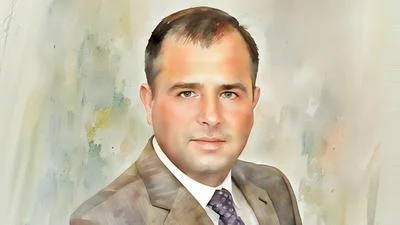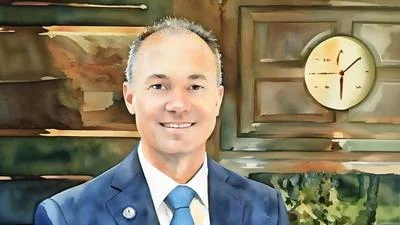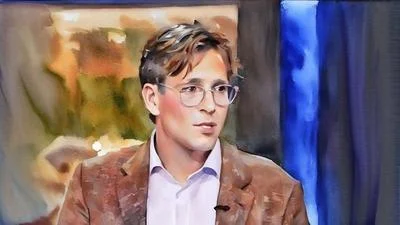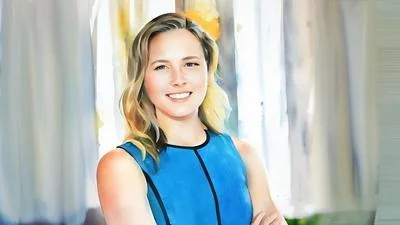Rev. Corey Brooks is a pastor, author, community activist and the founder and senior pastor of New Beginnings Church of Chicago. He is also the founder and CEO of the nonprofit organization Project H.O.O.D.
Federal Newswire:
What made you decide to join the ministry?
Rev. Corey Brooks:
First of all, my mother made me always go to church from the time I was a little kid all the way up through my teenage years. When I was 14, I became a really rebellious teenager. I was in high school, I played sports and was really good.
I really had a disdain for preachers, for whatever reason, I just didn't like them. I tell people, I thought all the black preachers that I was familiar with drove Cadillacs. That was my concept, my mindset. But at 14, oddly so, I really felt the Lord calling me to be a preacher and I could not understand that for the life of me, especially since I could not stand preachers. For four years, I really ran from that calling. I just did not want to do it.
At 19, I really finally submitted and surrendered to the Lord, and I'm glad I did. Ever since that time, I've been serving the Lord as faithfully as I possibly could and can. I love ministry. I love doing the work of the Lord.
Federal Newswire:
How is faith an important part of your work in communities?
Rev. Corey Brooks:
I think a lot of times in our community, we've depended on government to try to fix the problem, and I think a lot of us have realized that government does not have the answers, nor does it have the solutions to the ills that we're facing every single day.
From my perspective, I believe that the church is the hope of the world. I believe that the solution that we offer is the best solution. I think the principles that we try to get people to live by are the best principles.
We tell people, “Listen, it's good to have a child when you're married and have a spouse, [and] single-parent households – which are 80% of the households in our neighborhood – bring with them a lot of issues and a lot of problems.”
I think the principles that we believe in and that we offer help to teach people that they can have a more productive life and a better life. I believe that the church – that Jesus – is the answer.
We have the solutions. We can do it way better than government. Government, it may change some policies and legislate some laws, but it cannot have an impact on the hearts and the minds of people. That's what we offer.
Federal Newswire:
Do you agree that government can provide goods and services but is not in the business of satisfying souls?
Rev. Corey Brooks:
Without a shadow of a doubt. If you're going to solve the problems that we face in humanity, then you have to go down the road of getting to people's hearts and minds.
I think a lot of times that is left out and as a result, we continue to have systems in place that bring about the demise and the destruction that we see every single day in America. To work on the hearts and the minds of people, I believe is the best work, and the really lasting true work.
Federal Newswire:
When dealing with gang violence, is it important to show that there is a better way to live life?
Rev. Corey Brooks:
It's about every person being empowered, every individual being empowered, and teaching them to live a productive life. For us, that's what it's really all about. The reason why we teach work is because it brings dignity that people cannot get sometimes in any other way.
We believe in giving hands up and not hands out. We believe in helping people to rise to the occasion and that if you give them the assistance that they need, most people are able to meet the challenges and grow from them.
Federal Newswire:
Does government empower or disempower people to act on their own behalf?
Rev. Corey Brooks:
Post-'60s liberalism has been slowly, consistently and strategically making people become more dependent upon government, disempowering them, so to speak – putting in practices and laws that cause people to have to depend on the government.
I think the best way to have a society to be strengthened, and a community to be strengthened, is for them to not have that dependency.
They need to have work ethic, hope, empowerment and not disempowerment because that only leads to destruction and chaos. It only leads to even more inward frustration.
But when people are empowered – every individual – they start to see for themselves that they can change the direction of their lives, and they don't have to wait on anybody to do it for them. They can take the bull by the horns and take it for the ride, and do the thing that they need to do to bless their families. That's what it's really all about, empowering over disempowering.
Federal Newswire:
Your church is called New Beginnings Church of Chicago, what does that mean to have a new beginning and what services do you provide?
Rev. Corey Brooks:
We believe that every person is created to accomplish the purpose that God has created them for – with a little help, with a little assistance. Sometimes they need a little washing and inspiring.
We believe that every person, regardless of their mess ups and mishaps, is deserving of a new, fresh start – a new beginning. In that new beginning, we envision making sure that people get the hope and the assistance that they need to get their lives on track. Therefore, we started an organization out of New Beginnings Church called Project H.O.O.D.
H.O.O.D. stands for Helping Others Obtain Destiny. With that not-for-profit, we started to build all the programs that we thought are necessary outside of our church that would help an individual to get back on track.
Federal Newswire:
What challenges have you faced dealing with government in Chicago?
Rev. Corey Brooks:
It is funny you ask me that question because today I'm going to be doing a video just on that subject, the challenges that I faced.
You would think in this modern time that people would not have to go through these issues that we had to face making some of the decisions that we made and being conservative. You would think in this modern time that people would have the option or the opportunity to be free to choose whatever party, whatever policies that they desire.
But that's not the case in liberal Chicago, on the South Side, being a black preacher. It is believed that you are supposed to be a Democrat, liberal-minded, and anything contrary to that is opposition to the status quo.
About 8-10 years ago, I decided to come out of the closet as it relates to my political affiliations. I never talked politics or let people know my politics. But I decided I was going to support a Republican who was running for governor at that time, Bruce Rauner, and I was going to start espousing my conservative viewpoints and beliefs.
I've been a Republican and a conservative ever since I was 19 and a freshman at Ball State University, where I decided to take my first political science course and found out the difference.
But when I started to talk about it and I supported this Republican governor, we were challenged to the very core.
We lost about 75% of our congregation. At that time, we were at about 2,000 people, really strong. The attacks that the unions, Democrats and politicians were giving me, it was an onslaught. I didn't even know I was going to survive it because they were hitting me from everywhere with everything that they had. So much so that my family had to go into hiding for two weeks of the campaign, [because] there were death threats.
They talked about it on the media and on TV about these death threats that we had gotten and that we had to hide. It was people picketing the church and my house. It was horrible.
But, I found out that whatever does not kill you definitely can make you stronger, and our church is all the more stronger as a result. Our not-for-profit came into existence as a result of it, and we've been able to do some amazing work.
Even though we got challenged, we got hit, it hurt, it was difficult, it was trying, we have been able to overcome.
Federal Newswire:
Has the city of Chicago attempted to thwart you?
Rev. Corey Brooks:
At a grassroots level, at a community level, we're highly respected and appreciated. The work that we have done and that we continue to do builds trust in the people who are around us.
The people who are around us could care less about my political opinion or thoughts because they see the work that we do. They see how many people we help on a consistent basis and how many people we desire to help them transform their lives. It's appreciated.
On the other end of the spectrum…government sometimes can be a mean, cruel entity. I think we've had great hits from politicians not wanting to come alongside and help us in programming. Even though we may be the best at what we do, it's hard sometimes to get the attention from the individuals who make decisions.
For instance, our violence prevention team is probably one of the best in Chicago. While in the rest of Chicago the violence has been going up, in our neighborhood where it was written that we were the most violent neighborhood in 2014, it's been going down. That's due to the work of our violence prevention team.
But it's hard to get the attention because they definitely don't want to look in our direction.
Federal Newswire:
Shouldn’t the city of Chicago be interested in seeing your programs succeed?
Rev. Corey Brooks:
I think that they only want to solve the problem if they come up with the solution. I don't believe people want to see the violence or crime that we are consistently seeing, but I also believe that they don't want someone outside of their circle coming up with a solution that works.
They'd rather continue the cycle of poverty and crime and victimization than to see a solution come from a place that they don't desire for it to come from. That's the reason why I believe we're seeing these issues.
Federal Newswire:
How are you preventing gang violence and helping formerly incarcerated individuals?
Rev. Corey Brooks:
One, let's talk about the gangs and what we're doing with them. In our neighborhood, we've decided to hire individuals from most of the gangs that are functioning in our neighborhood. We decided to hire two or three full-time individuals from those areas, train them on trauma counseling, conflict resolution, help them to redevelop their mindset and soften their hearts.
We started to work with them to teach them the ways that violence has impacted our community, but also the ways that they need to now turn their lives toward trying to help fix the issue.
We have these individuals working from different gangs who used to be enemies of one another, they would call themselves ops or opposition, who are now working together.
As a result, we are now able to get ahold of the violence, we're able to now get ahold of making sure that there's no retaliation. That's one of the reasons why we've been so effective in decreasing our numbers because we've been able to really get to the very grassroots level of the violence and deal with it.
From those 14 individuals, we have 40 part-time individuals out of those same neighborhoods – most of them coming out of gangs. Their job is to go back to those corners, tell them about the resources, promote and recruit [just like the gangs do]. We recruit just like them. But the thing is, we have benefits. We have things that can assist them with their families, education, empower them – not disempower them – and that makes the difference.
Then of course, we have our reentry program, where people come out of jail, and they come to us. We set up a plan of attack to get them on the right track, to get them back into society and to get reconnected to their families. We do those two things very well.
Federal Newswire:
How does the constant reminder of criminal activity impact the psyche of someone who's just gotten out of jail, and how do you address that issue?
Rev. Corey Brooks:
It's a mindset change that has to happen.
The first mindset change that has to happen is to help the individual understand that, yes, you may have committed a crime and you may have done the time, but now that you're out, there are people who want to help you to transform your life. If you're willing to take responsibility and get your life back on track, then we have programs and systems that will help you do that.
I think when those programs and systems and people are not in place, then it causes individuals to constantly believe that everything that they've done, every mistake that they've made, is going to continue to hold them back. Because everything that they try to involve themselves in, whether it's getting an apartment, a job or being a volunteer, it is always constantly reminding them of the mistake they made.
Here at Project H.O.O.D., we try to take that away and replace it with something that is empowering.
Federal Newswire:
Do you work with the probation and parole system?
Rev. Corey Brooks:
Yes. A lot of times we'll have a probation officer who will call us and say, "Hey, I have a guy who’s getting out... or a lady who’s getting out," and I think they would be perfect for your program – It seems as if they want to try to get their life on track." They'll bring them to us or they'll call us.
That happens a lot. We appreciate it because it gives us a segue into their lives to get them before they even get out of prison, and to let them know that when you get out of prison, report to us and we're going to assist you. We're grateful for those individuals, those probation officers, who send people to us on a consistent basis.
Federal Newswire:
How do you help give them practical skills?
Rev. Corey Brooks:
We have a trade school and we try to teach the trades, because we really do believe that there are so many opportunities. We teach people carpentry and electrical work. We're building a brand new, 89,000-square-foot community center. We can also add HVAC and automotive.
But we also teach entrepreneurship. Because some of them may not be interested in trades, and some of them are business-minded people who just got led astray. But they know business principles. So we help them to start businesses and become entrepreneurs.
We try to equip them with the gift of skills, talents and abilities and enhance what they already have so they can get back on track.
Federal Newswire:
Can you explain the time you climbed up on a roof for a cause?
Rev. Corey Brooks:
The first time was 11 years ago. I went up on the roof to bring attention and awareness to the violence in the neighborhood.
It was a motel that was highly infested with prostitution and crime. We wanted to take it over and get rid of that element. I went up on the roof of that motel to bring attention and to raise money. I thought it would take a week to raise the money we needed, but it ended up taking 94 days from Nov. 20 to Feb. 24, it was the whole winter of Chicago.
We finally raised all the money, purchased the motel, tore it down and we started endeavoring to build a center. After 10 years, we realized we've been talking about this center, but we have not gotten any further. What can we do?
It was a 10-year anniversary, so I said, "Let's get some containers together, build a roof and put some tents back on top, and I'll go on the roof again and raise money to build this community center."
And that's exactly what I did. But this time it took 343 days for us to raise upward of $30 million, where we are now, for a center that's going to cost a shade over $35 million. We're trying to build it debt free.
Federal Newswire:
Explain what the “world’s largest baby shower” is.
Rev. Corey Brooks:
I'm one of those people who believes in whatever it takes to get the job done.
One of the things that we realized is that in our neighborhood, 80% of the households are single-parent households. We started trying to figure out what is the best way to minister to some of these single parents and to get their children involved from the cradle. How can we promote life and not death?
We said, let's have the world's largest baby shower, and really start actively pursuing these mothers, to give them the assistance that they need for their babies while they're in prenatal care. Then after they're born, to make sure that we're there to assist them as well with parenting skills that may be needed, or whatever resources.
It gives us an opportunity to get involved in their life at the earliest point so that we can effectively make change.
We're going to have the world's largest baby shower. We're going to bless as many mothers who are having babies, or have 1-year-olds and below, as much as possible and give them everything that they need and all the resources to get a good start.
Another reason to have this baby shower was because we want to promote life. There is so much death, not just with killings and crime, but with abortions.
It's an alarming rate of abortions that happen every single day in the black community. The sad part about it is that not only are these abortions happening every single day in the black community, but there are not enough people who are saying, “Hey, we want to assist you with adoption,” or “We want to assist you with this baby, we want to make sure that you have a life.”
Unfortunately, you have these clinics and people who are promoting this death all around. A lot of times, unfortunately, these young women take that option. We want to make sure that we give them another option, another opportunity, so that they don't take the death option.
Federal Newswire:
What are the differences between a two-parent household and a one-parent household?
Rev. Corey Brooks:
Two-parent household, we all know that's the standard. That's what we believe that's how it should be. But we also know in reality that oftentimes there are a lot of people who have children outside of wedlock. As a result, when they have these children outside of wedlock, those children become more acceptable to a lot of different things percentage-wise, it's just percentage speaking, that for normal children it is not the same.
I don't want to say normal children are children born of two-parent households. The percentages are just not the same as far as education goes, who graduates high school, as far as crime goes, who goes off to prison, as far as jobs go, who gets the jobs and the increases that they have. All of those things are important, but we realize that although they're important, that sometimes these single parents, they have these children and they need help, they need assistance.
I'm from a single-parent household, but I still believe that a two-parent household is the best way. But I also am grateful and thankful that there were some mentors, some preachers, some organizations, who came alongside my mom and made a positive impact on my life to keep me going in the right direction.
I think that's what we're trying to teach here at our church. That's what we're trying to teach at our not-for-profit, that we still have to come alongside and assist all of these single parents to make sure that their children have a shot at the American dream.
Federal Newswire:
How did the COVID closures impact kids in inner-city Chicago?
Rev. Corey Brooks:
When our children were out of school during the pandemic – mind you, a lot of them were already academically behind – even though they're telling them to be on these computers, they were not on the computer. A lot of these kids missed out on a year and a half, some even two years, of education. Because of that, we've seen a drastic increase in the amount of children who are not able to read at grade level.
In our neighborhood alone, we have a 3% reading proficiency and a 6% math proficiency. That means only 3% of the children in our neighborhood in grades one through six are reading at grade level. I think that is an issue.
Federal Newswire:
Pastor Brooks, how do folks find out more about the work you are doing?
Rev. Corey Brooks:
They can go to projecthood.org. They can find out about all the work that we're doing in the city of Chicago, how they can help us to do the work and how they can stay abreast of what we're doing as well.









